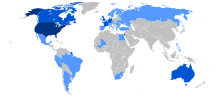
Back إسرائيليون Arabic اسرائيليين ARZ İsraillilər AZ Israelians Catalan ئیسرائیلییەکان CKB Izraelci Czech Israeliaid CY Israelere Danish Israelis German Pueblo israelí Spanish
ישראלים إسرائيليون | |
|---|---|
 | |
 Map of the Israeli diaspora | |
| Regions with significant populations | |
| Israel | c. 9.8 million (including occupied territories)[1] |
| United States | 106,839[2] – 500,000[3][4] |
| Russia | 100,000 (80,000 in Moscow)[5][6] |
| India | 40–70,000[7] |
| United Kingdom | 11,892[8] – 50,000[8][9][10] |
| Canada | 21,320[11] |
| Australia | 15,000[12] |
| Netherlands | 10,371[13] |
| Germany | 10,000[14][15][16] |
| Languages | |
| Hebrew (official) Arabic (recognized) English, Russian, French, Amharic, Tigrinya, various others (see languages of Israel) | |
| Religion | |
| Majority: Judaism Minority: Islam, Christianity, Druzism, Samaritanism, Baháʼí Faith | |
Israelis (Hebrew: יִשְׂרְאֵלִים, romanized: Yīśreʾēlīm; Arabic: إسرائيليون, romanized: Isrāʾīliyyūn) are the citizens and nationals of the State of Israel. The country's populace is composed primarily of Jews and Arabs, who respectively account for 75 percent and 20 percent of the national figure, followed by other ethnic and religious minorities, who account for 5 percent.[17]
Early Israeli culture was largely defined by communities of the Jewish diaspora who had made aliyah to British Palestine from Europe, Western Asia, and North Africa in the late-19th and early-20th centuries. Later Jewish immigration from Ethiopia, the post-Soviet states, and the Americas introduced new cultural elements to Israeli society and have had a profound impact on modern Israeli culture.
Since Israel's independence in 1948, Israelis and people of Israeli descent have had a considerable diaspora, which largely overlaps with the Jewish diaspora but also with that of other ethnic and religious groups; it is estimated that almost 10 percent of the general Israeli population lives abroad, particularly in Russia (with Moscow housing the single largest Israeli community outside of Israel), India, Canada, the United Kingdom, the United States, and throughout Europe.[18]
- ^ "Population of Israel on the Eve of 2024" (PDF) (in Hebrew). Central Bureau of Statistics, State of Israel. 28 December 2023. Retrieved 31 December 2023.
- ^ Ancestry: 2000 Archived 4 December 2004 at the Library of Congress Web Archives
- ^ Cite error: The named reference
jj-popwas invoked but never defined (see the help page). - ^ Cite error: The named reference
Lahav 2005 89was invoked but never defined (see the help page). - ^ [100,000 Former Soviet Jews in Israel Return To Russia, By Michael Mainville, The Toronto Star]
- ^ Israelis Find A Lively Jewish Niche in Moscow Archived 15 August 2014 at the Wayback Machine by Rena Greenberg – Moscow, Russia, 19 March 2014
- ^ A. Craig Copetas (19 December 2007). "Karma Kosher Conscripts in New-Age Diaspora Seek Refuge in Goa". Bloomberg.com. Archived from the original on 24 September 2015. Retrieved 3 October 2013.
- ^ a b "Israelis in London prefer their own". Archived from the original on 8 June 2011. Retrieved 23 December 2008.
- ^ HAVIV RETTIG GUR (6 April 2008). "Officials to US to bring Israelis home". Jpost. Archived from the original on 30 April 2019. Retrieved 19 October 2013.
- ^ "Country-of-birth database". Organisation for Economic Co-operation and Development. Archived from the original on 17 June 2009. Retrieved 23 December 2008.
- ^ Cite error: The named reference
www40.statcan.gc.cawas invoked but never defined (see the help page). - ^ Dan Goldberg (3 July 2012). "Jews Down Under are on the rise, but for how long?". Haaretz. Archived from the original on 24 September 2015. Retrieved 24 October 2013.
- ^ "CBS". Archived from the original on 3 August 2017. Retrieved 26 March 2020.
- ^ Hagin, Adi (16 September 2011). "Why are Israelis moving to Germany?". Haaretz. Archived from the original on 17 October 2015. Retrieved 18 March 2013.
- ^ Assaf Uni (3 September 2012). "Israelis in Berlin buying their strudel with welfare". Times of Israel. Archived from the original on 19 July 2019. Retrieved 18 March 2013.
- ^ Doron Halutz (21 January 2011). "Unkosher Nightlife and Holocaust Humor: Israelis Learn to Love the New Berlin". Spiegel Online. Archived from the original on 30 June 2019. Retrieved 18 March 2013.
- ^ "Statistical Abstract of Israel 2015". Archived from the original on 24 December 2018. Retrieved 7 February 2016.
- ^ Eric, Gold; Moav, Omer (2006), Brain Drain From Israel (Brichat Mochot M'Yisrael) (in Hebrew), Jerusalem: Mercaz Shalem – The Shalem Center, The Social-Economic Institute, p. 26, archived from the original on 10 May 2017, retrieved 1 March 2016.